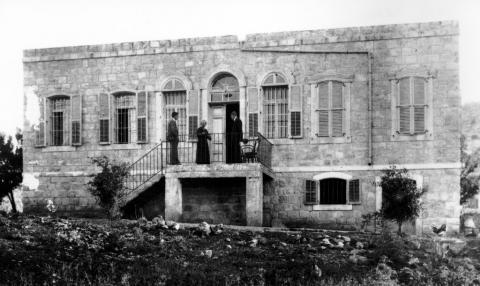Once ‘Abdu’l-Bahá asked His Father, Bahá’u’lláh why it was He had never clearly designated the language that was to become universal. And Bahá’u’lláh said, very simply, "Because no one ever asked Me." This answer has always filled me with a sense of frustrated awe. To think that the opportunity was given mankind to learn the answers to questions that had puzzled him since the beginning of time to have the mysteries of the universe solved! If only he had asked the questions and known the right questions to ask.
Universal Language
‘Abdu’l-Bahá told another story pointing out the necessity of one common language: ‘At the city gate four travelers sat, a Persian, a Turk, an Arab and a Greek. They were hungry and wanted their evening meal. So one was selected to buy for them all. But among them they could not agree as to what should be bought. The Persian said angoor, the Turk uzum, the Arab wanted aneb and the Greek clamoured for staphylion, green and black. They quarrelled and wrangled and almost came to blows in trying to prove that the particular desire of each was the right food. When all of a sudden there passed a donkey ladened with grapes. Each many sprang to his feet and with eager hands pointed out” “See uzum!” said the Turk. “See aneb!” said the Arab. “See angoor!” said the Persian. And the Greek said, “See staphylion!” Then they bought their grapes and were at peace.’
He was asked whether Arabic might become the universal language. He said that it would not.
In Edinburgh, ‘Abdu’l-Bahá addressed the Esperantists. A serious advocate for the establishment of an international auxiliary language, He cited an anecdote to stress how important proper communication between people is: ‘I recall an incident which occurred in Bagdad. There were two friends who knew not each other’s language. One fell ill, the other visited him, but not being able to express his sympathy in words, resorted to gesture, as if to say, “How do you feel?” With another sign the sick [one] replied, “I shall soon be dead”; and his visitor, believing the gesture to indicate that he was getting better, said, “God be praised!”’
Once a reporter in London inquired about ‘Abdu’l-Bahá’s plans to his astonishment the Master replied in English. The reporter commented on His good pronunciation, whereupon ‘Abdu’l-Bahá ‘rose up and, pacing the room, uttered a number of complicated English words, such as “hippopotamus”, and then laughingly said, “Very difficult English words I speak.”’
